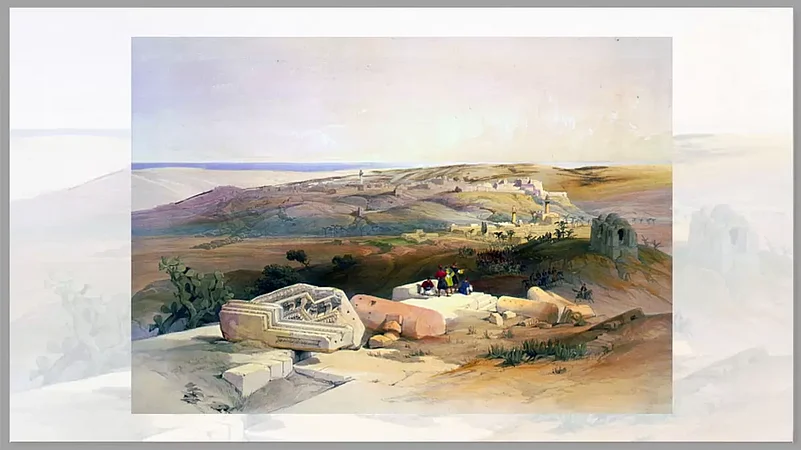“The Lord appeared to Abraham and said, "To your offspring I will give this land." So he built an altar there to the Lord, who had appeared to him"
(Gen. 12:7, NIV)
“The Sovereign Lord Says “I will gather you from the nations and bring you back from the countries where you have been scattered, and I will give you back the land of Israel again.”
(Ezekiel 11:17 (NIV))
For the day has come
to destroy all the Philistines
and to remove all survivors
who could help Tyre and Sidon.
The Lord is about to destroy the Philistines,
the remnant from the coasts of Caphtor.
Gaza will shave her head in mourning;
Ashkelon will be silenced.
You remnant on the plain,
how long will you cut yourselves?
(Jeremiah 47:1-7 (NIV))
“Seventy sevens” are decreed for your people and your holy city to finish all transgression, to put an end to sin, to atone for wickedness, to bring in everlasting righteousness, to seal up vision and prophecy and to anoint the most holy"
(Daniel 9:24-26:)
The Bible (Old and New) is a book of prophecies, and many of the ones attributed to the ‘Major Prophets’ have a direct bearing on the formation of Israel as a nation-state. Jerusalem is a key site for all three Abrahamic religions: Judaism, Christianity and Islam. This makes it an important flashpoint of religious and territorial wars that have been fought over the centuries for the control of the “holy land”.
Over 15,000 Palestinians have been killed in the last two months since Benjamin Netanyahu’s offensive in Gaza following a Hamas-led attack on Israel. While the bloodshed was condemned by many human rights organisations and defenders across the world and several countries have supported the call for a ceasefire, Israel’s unprecedented attack on Gaza continues to enjoy the support of much of the Western world, including Jewish people and Christians, leading many in Palestine and other parts to dub the ongoing Gaza offensive as a “religious” or “holy war”. Like a 21st-century crusade.
Such a moral justification of violence is amplified by evangelists and rabbis who across the world have been invoking the myriad of biblical prophesies to justify the violence. War is bad, yes. But what if it’s a necessary precursor for the second coming of Jesus Christ or the Messiah of Judah?
In Genesis, chapter 12, Abraham is given the first of many prophecies that his offspring will inherit the land on which he was standing, which later became the land of Israel. There is a belief among Zionists and orthodox Christians or Jews that the 1948 state formation of Israel was intrinsic in setting off the last stage of the prophecies. While some believe the 70th week started with the 1948 state formation of Israel, others opine that 1967—the year of the Six Days War in which Israel conquered its neighbouring territories, including Gaza and West Bank and began its occupation of Palestine.
Overall, the tonality and end goal of most of these prophecies describe the expulsion of the Jewish people from their holy land and the destruction of the temple, the coming of a Messiah and his subsequent killing, a period of strife and wait until the second coming of the messiah which can only happen after a regathering of the Jewish people in their holy land.
Ezekiel prophesies, “I will bring them out from the nations and gather them from the countries, and I will bring them into their own land. I will pasture them on the mountains of Israel, in the ravines and in all the settlements in the land”. Meanwhile,
Jeremiah gives a graphic description of the killing of “Philistines”.
Among this, there is another prophecy called “Daniel’s Prophecy of Seven Weeks”, contained in the Book of Daniel in the ‘Writings’ section of the Hebrew Bible. Each “week” refers to a seven-year period and the “Seventy Sevens” totals to 490 years, as per Jewish evangelists. A nobleman, Daniel of the Kingdom of Judah received from god’s angel Gabriel while exiled in Babylon. (The Babylonian exile of the Jewish people has also been prophesied in by other prophets in the Bible)
Daniel, who was living at the time of the “Fall of Jerusalem”, destruction of the temple of Solomon and the Babylonian exile of Judeans, prophesied the Jews would return from captivity and rebuild Jerusalem and the Temple and afterwards, an “anointed one,” or Messiah, would appear, but he would be rejected. Then, Jerusalem and the Temple would be destroyed again. This would mark the end of the 69 of the “Seventy Sevens” and it is believed to have happened at the time of the crucifixion of Jesus Christ (the messiah who was cut off) and the destruction of the Second Temple of Jerusalem.
The last or 70th week (70 years) will see the Jewish people return to their holy land and the eventual resurrection of the messiah along with the return of the Jews to their holy land and the restoration of the Third Temple, which will signal the end of times.
This return or “gathering of the Jews” has been prophesied by many like Ezekiel, and forms the core of Zionist/Christian Zionist political philosophy.
Evangelical Christians see the formation of Israel and restoration of the Temple in Jerusalem (where the Al Aqsa mosque currently stands) is necessary for the second coming of the Messiah. On the Old Testament, the prophet Isaiah predicted that God “shall set up an ensign for the nations, and shall assemble the outcasts of Israel, and gather together the dispersed of Judah from the four corners of the Earth.” Thus Israeli state formation is essential to the second coming of Christ.
But while in Judaism, the messiah from Daniel’s prophecy is believed to be a future Jewish king from the line of David and “redeemer of the Jewish people and humanity, Christians believe Jesus is the Messiah, the Saviour and Redeemer.
Abrahamic religions share certain affinities and a similar apocalyptic prophecy about the coming of Prophet Mohammad’s descendant Al Mahdi exists I’m Islamic eschatology as well and plays an important role in understanding the three-way fight for the Holy Land. Al Mehdi is prophesied to appear at the End of Time to rid the world of evil and injustice. He will lead the Muslims to rule the entire world.
According to Christian evangelism, however, a false prophet or the Antichrist will rise after the regathering of the exiled Jews and lead to the apocalypse. The true Messiah, Jesus Christ, shall then rise in the End of Time.
These religious notions have played a big role in the international support that Israel’s state formation has received from Christian-dominated western nations, especially the USA where the religious right solidified into a power bloc under the Ronald Reagan era.
Having faced historic persecution at various junctures of their long existence including the Holocaust, much of the contemporary history and identity of the Jewish people is tied to their faith in the “promised land” and “return to holy land” doctrines. That Abraham’s descendant (who is the messiah) will get the land promised to him by God in the Book of Genesis and that the son of David would rise as redeemer.
Not surprising then that some conservative evangelists and “prophecy experts” have been using these prophesies to justify the violence in Gaza. Christian author Jeff Kinley, one such US-based “prophecy expert” has been appearing on the Christian Broadcasting Network’s talk show regularly since the escalation of violence in Gaza and likening the present situation as “prophetic” and a precursor to apocalypse.
“God promised that land to Abraham … Satan and those other countries surrounding Israel have never wanted Abraham to get the promised land,” he said.
Prime Minister Benjamin Netanyahu, a champion of the right and a frontrunner of the Christian Zionist Israel-US lobby, has also been using Biblical rhetoric to justify Israel’s assault on the Gazan population. Quoting the Torah (the Hebrew Bible), Netanyahu defended the ground invasion of Gaza at the cost of civilian casualties by saying, “There is a time for peace and a time for war”. This is a time for a war”. He has also invoked the Torah to refer to Hamas as the Amalek—the biblical arch-enemy of the Israelites who historically rejected Daniel’s prophesy of the media’s return. This is a nod to Israel’s orthodox, right-wing factions that have often used these Biblical references and prophesies to justify persecution of Palestinians or other non-Christians in the region.


























